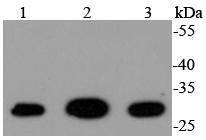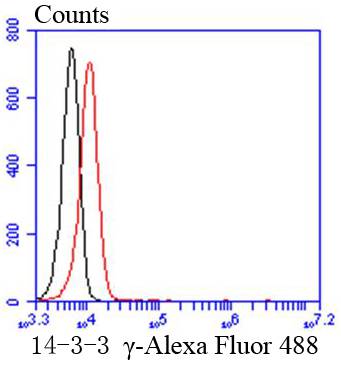Product Name :
14-3-3γ polyclonal antibody Background :
14-3-3 proteins regulate many cellular processes relevant to cancer biology, notably apoptosis, mitogenic signaling and cell-cycle checkpoints. Seven isoforms comprise this family of signaling intermediates, denoted 14-3-3 b, g, e, z, h, q and s. 14-3-3 proteins form dimers that present two binding sites for ligand proteins, thereby bringing together two proteins that may not otherwise associate. These ligands largely share a 14-3-3 consensus binding motif and exhibit serine/threonine phosphorylation. 14-3-3 proteins function in broad regulation of these ligand proteins; by cytoplasmic sequestration, occupation of interaction domains and import/export sequences, prevention of degradation, activation/repression of enzymatic activity, and facilitation of protein modification. Loss of expression contributes to a vast array of pathogenic cellular activities. Product :
Rabbit IgG, 1mg/ml in PBS with 0.02% sodium azide, 50% glycerol, pH7.2 Storage&Stability :
Store at +4°C after thawing. Aliquot store at -20°C or -80°C. Avoid repeated freeze / thaw cycles. Specificity :
14-3-3γ polyclonal antibody detects endogenous levels of 14-3-3γ protein. Immunogen :
recombinant protein Conjugate :
Unconjugated Modification :
Unmodification
14-3-3γ polyclonal antibody Background :
14-3-3 proteins regulate many cellular processes relevant to cancer biology, notably apoptosis, mitogenic signaling and cell-cycle checkpoints. Seven isoforms comprise this family of signaling intermediates, denoted 14-3-3 b, g, e, z, h, q and s. 14-3-3 proteins form dimers that present two binding sites for ligand proteins, thereby bringing together two proteins that may not otherwise associate. These ligands largely share a 14-3-3 consensus binding motif and exhibit serine/threonine phosphorylation. 14-3-3 proteins function in broad regulation of these ligand proteins; by cytoplasmic sequestration, occupation of interaction domains and import/export sequences, prevention of degradation, activation/repression of enzymatic activity, and facilitation of protein modification. Loss of expression contributes to a vast array of pathogenic cellular activities. Product :
Rabbit IgG, 1mg/ml in PBS with 0.02% sodium azide, 50% glycerol, pH7.2 Storage&Stability :
Store at +4°C after thawing. Aliquot store at -20°C or -80°C. Avoid repeated freeze / thaw cycles. Specificity :
14-3-3γ polyclonal antibody detects endogenous levels of 14-3-3γ protein. Immunogen :
recombinant protein Conjugate :
Unconjugated Modification :
Unmodification
-
 Western blot analysis of 14-3-3 gamma on different lysates using anti-14-3-3 gamma antibody at 1/1,000 dilution. Positive control: Lane 1: 293T Lane 2: A431 Lane 3: Hela
Western blot analysis of 14-3-3 gamma on different lysates using anti-14-3-3 gamma antibody at 1/1,000 dilution. Positive control: Lane 1: 293T Lane 2: A431 Lane 3: Hela -
 Flow cytometric analysis of K562 cells with 14-3-3 gamma antibody at 1/50 dilution (red) compared with an unlabelled control (cells without incubation with primary antibody; black). Alexa Fluor 488-conjugated goat anti rabbit IgG was used as the secondary antibody.
Flow cytometric analysis of K562 cells with 14-3-3 gamma antibody at 1/50 dilution (red) compared with an unlabelled control (cells without incubation with primary antibody; black). Alexa Fluor 488-conjugated goat anti rabbit IgG was used as the secondary antibody.
Bioworld Biotech only provide peptides for our antibodies and do not provide additional peptide customization services.
Price/Size :
USD 368/1mg/vial
Tips:
For phospho antibody, we provide phospho peptide(0.5mg) and non-phospho peptide(0.5mg).Describe :
Blocking peptides are peptides that bind specifically to the target antibody and block antibody binding. These peptide usually contains the epitope recognized by the antibody. Antibodies bound to the blocking peptide no longer bind to the epitope on the target protein. This mechanism is useful when non-specific binding is an issue, for example, in Western blotting (WB) and Immunohistochemistry (IHC). By comparing the staining from the blocked antibody versus the antibody alone, one can see which staining is specific; Specific binding will be absent from the western blot or IHC performed with the neutralized antibody.Formula:
Synthetic peptide was lyophilized with 100% acetonitrile and is supplied as a powder. Reconstitute with 0.1 ml DI water for a final concentration of 10 mg/ml.The purity is >90%,tested by HPLC and MS.
Storage:
The freeze-dried powder is more stable. For short time at 2-8°C. For long term storage store at -20°C.
Note :
This product is for research use only (RUO only). Not for use in diagnostic or therapeutic procedures.
 14-3-3γ polyclonal antibody
14-3-3γ polyclonal antibody  Datasheet
Datasheet COA
COA MSDS
MSDS SHIP
SHIP